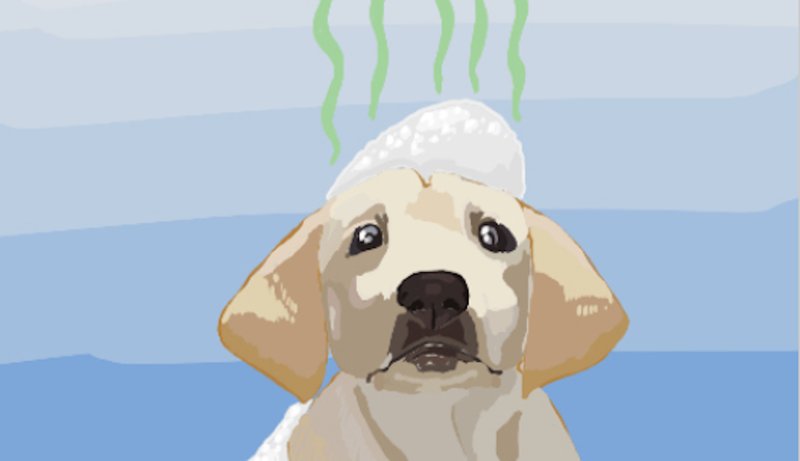Q My puppy, Cooper, got skunked today. Is skunk gunk toxic to puppies? Also, please recommend a safe way to get rid of the stench on a puppy.
A The standard commercial skunk remedies, like Skunk-Off and Nature's Miracle Skunk Odor Remover, are safe for puppies. Or you can try one of these homemade recipes:
◼️ Mix 1 quart of 3% hydrogen peroxide, ¼ cup baking soda (sodium bicarbonate) and 1 to 2 teaspoons dishwashing liquid. While the brew bubbles, rub it on Cooper. Leave it on for 10 to 15 minutes and then rinse well. Repeat if necessary.
◼️ Use tomato juice to dip Cooper. Let it dry, wash it out, and then bathe him with dog shampoo.
◼️ Bathe him with Dawn dishwashing liquid followed by dog shampoo.
◼️ Use double-strength Massengill vinegar and water powder as a dip (this is a feminine hygiene product).
Skunks can spray their "gunk" (called musk, actually a sulfur-containing anal sac excretion) 7 to 15 feet, and their aim is accurate.
If the spray hit Cooper's eyes, it could cause conjunctivitis or a corneal ulcer. So, if he's rubbing his face, flush his eyes with plenty of eyewash or water, and make an appointment with your veterinarian.
If the skunk sprayed Cooper's mouth, he's probably drooling, so rinse his mouth with lots of water. If he swallowed skunk musk, it could damage his red blood cells.
A more serious problem is that skunks can carry rabies. If the skunk connected with Cooper, make an appointment with your veterinarian.
Since medical problems rarely develop after a dog is sprayed by a skunk, your primary concern is probably the odor. Even after treatment, it could return when Cooper is bathed or gets drenched by rain. I experienced the same problem when one of my dogs was skunked, so you have my sympathy and best wishes.
Q My veterinarian diagnosed my new kitty, Lily, with ringworm and prescribed lime sulfur dips twice weekly. Should Lily also receive oral medication? What about cleaning my floors and furniture?
A Ringworm — which is actually caused by a fungus, not a worm — often resolves on its own within three months. However, it can spread from cats to humans, infecting half the people exposed, so most veterinarians recommend treating cats for ringworm.
You have three treatment options: topical therapy, oral medication and environmental control. Treatment may consist of one or more of these options, depending on the severity of the cat's infection, the number of infected cats and the susceptibility of the humans exposed to the disease. Combination therapy can also hasten cure.
Topical therapy consists of the lime-sulfur dip prescribed for Lily, an enilconazole dip or an anti-fungal shampoo that contains miconazole and chlorhexidine. The dips are effective as sole therapy. Veterinarians usually prescribe topical therapy twice weekly.
Oral anti-fungal medication could also be recommended.
Finally, many veterinarians advocate environmental decontamination. Transmission almost always occurs through direct contact with the pet, but removal of ringworm spores from the home can help decrease spread of disease.
Dust furniture with damp wipes, and use a lint roller or sticky tape to remove hair. Wipe other hard surfaces with disinfectant or diluted bleach.
Clean hardwood and tile floors with a damp, disposable cloth, such as a Swiffer pad. Avoid brooms, which are difficult to decontaminate.
Vacuum carpeting and upholstery, and dispose of the bag. Hot water extraction, also called steam cleaning, is very effective.
Launder bedding and small rugs. Replace furnace filters.
Your job will be easier if you restrict Lily to one room you can clean easily until your veterinarian confirms that her ringworm is gone.
Lee Pickett, VMD, practices companion animal medicine in North Carolina. Contact her at
askthevet.pet
Style on 04/20/2020
